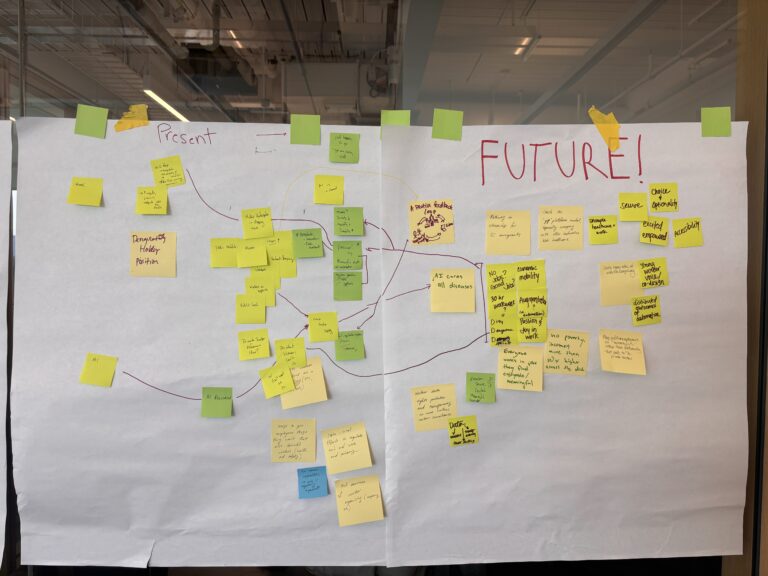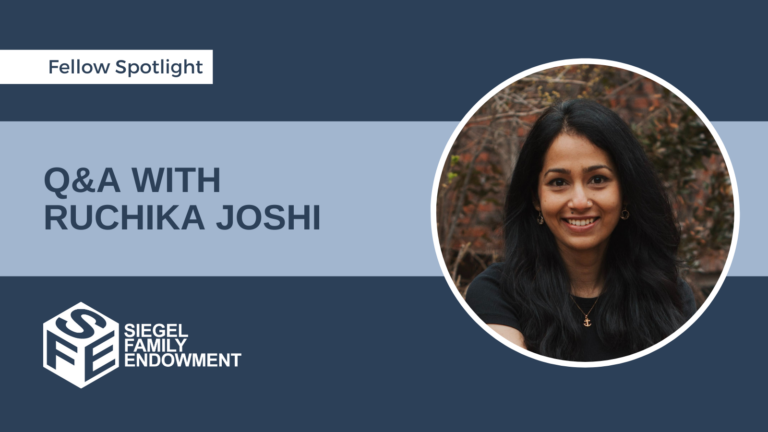The inaugural cohort of Siegel Research Fellows completed their fellowship year and are now our first class of alumni. The group of impressive researchers and academics produced publications presented and workshopped their research at monthly research seminars, and even published a book during their time as Siegel Research Fellows. Though the group of fellows were interdisciplinary, with backgrounds ranging from computer science to communications and economics, the cohort’s research topics coalesced around a few core issues, with important ones being mis- and disinformation, and multidimensional infrastructure.
Highlights from our Pilot Year
Below are a few examples from the past year that exemplify the ways in which the cohort helped to extend Siegel’s research strategy, which is built around knowledge creation, supporting and contributing to networks, and presenting novel insights:
- Sample of Fellow’s Research:
- Michael Bernstein Et al. Ethics and society review: Ethics reflection as a precondition to research funding
- Rachel Kuo From Our Fellows: Future Directions & Possibilities for Critical Disinformation Studies
- Sophie Kelmenson Et al, Inclusive Innovation in Advanced Manufacturing: Moving Forward with Shared Gains
- Siegel Insights piece:
- Samantha Bradshaw, “Trust and Safety Measures Fall Short When it Comes to Accessibility”
- Examples of Fellow’s Research Seminars:
- Kevin Aslett: The limited effect of news credibility labels
- Emily Tavoulareas: Teaching “Digital”: Landscape research on how “digital” is taught across schools of public policy and law
- Book Publication:
- Brandeis Marshall, Data Conscience: Algorithmic Siege on our Humanity
In Their Own Words
The aim of the Siegel Research Fellows Program is not only to extend our own in-house research capabilities, but to also support the fellows in pursuing their own research agendas and protect the fellows time to develop ideas and research projects (with input and guidance from others in the cohort) that may have otherwise been out of reach.
Here are a couple of the fellowship benefits the scholars have experienced.
Michael Bernstein, of Stanford University’s Center for Advanced Study in the Behavioral Sciences (CASBS) shares, “The feedback from the other Siegel Research Fellows was instrumental in shaping the framing and execution of my research. My project is far better for it!.”
MIT Fellow Alexander Kowalski, elaborates on the benefits of the interdisciplinary nature of the group, “The Siegel Research Fellowship was invaluable in introducing me to new perspectives on topics that were already familiar to me. Whether it was a different theoretical orientation, an exciting methodology, or firsthand knowledge of a particular technology, I learned from the other fellows new ways of understanding and analyzing the future of work.”
“Over the course of this fellowship, I made important connections with other scholars and received valuable feedback on my own work. By engaging me with diverse perspectives outside of my own subfield this fellowship significantly improved how I communicate my research and increase the impact of my work,” shared Kevin Aslett, from the Center for Social Media and Politics at New York University.
Next Steps for the Inaugural Cohort
Since the fellowship year has ended, many fellows have gone on to secure new positions within academia, what follows is a sample from the Siegel Research Fellows cohort:
- Emily Tavoulareas was a Fellow with the Beeck Center at Georgetown and is now the Managing Chair of Tech & Society at Georgetown University;
- Kevin Aslett was a Postdoctoral Associate in the Center for Social Media and Politics at New York University and is now an Assistant Professor at the University of Central Florida, School of Politics, Security, and International Affairs and the Cybersecurity and Privacy Research Cluster;
- Rachel Kuo was a Postdoctoral Research Fellow at the Center for Information, Technology, and Public Life at the University of North Carolina-Chapel Hill and is now an Assistant Professor of Media & Cinema Studies at the University of Illinois;
- Samantha Bradshaw was a Postdoctoral Fellow at the Program on Democracy and the Internet and the Digital Civil Society Lab at Stanford University and is now an Assistant Professor at American University’s School of International Service and Associated Faculty member at the Center for Security, Innovation and New Technology;
- Alexander Kowalski was a Ph.D. candidate in the Institute for Work & Employment Research at the Massachusetts Institute of Technology’s Sloan School of Management and is now an assistant professor in the Human Resource Studies department at Cornell University’s ILR School.
The Year Ahead
For the 2022-2023 fellowship year, we are expanding both the number and type of institutions hosting fellows. Last year we worked closely with eight academic centers across the country to select and host our fellows, this year we are extending support beyond academia to include think tanks and other non academic centers, like the Santa Fe Institute and Aspen Digital. In total, we expect to host fourteen fellows for this year’s cohort. In other exciting developments, we are working closely with the Center for Social Media and Politics (CSMaP) to host a multi-day in person event for fellows at New York University’s campus.





